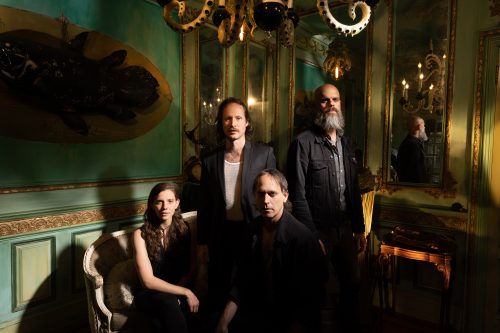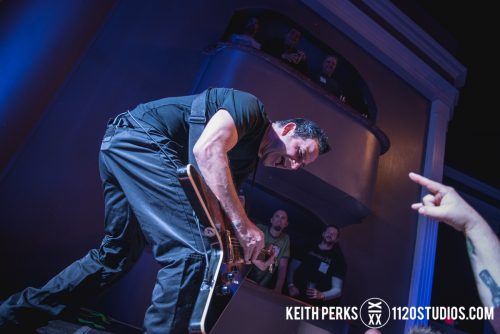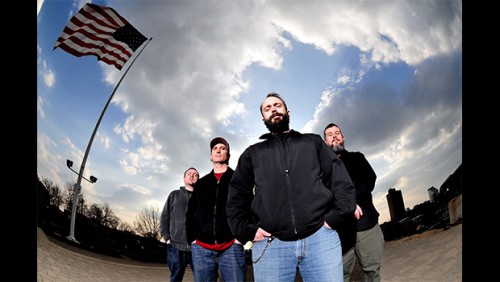Whether sequestering themselves in an Airbnb to make an album or dropping down to smaller venues to play shows with the setlists curated by the audience, Baroness, six albums into its career, is not giving complacency a chance to creep in.
“That’s a concern for most bands. That has been hard for a while,” Baroness drummer Sebastian Thomson says in a recent phone interview. “One of the things that makes it easier for Baroness is we’ve had a lineup change almost every album, which automatically changes the recipe. Some bands never change lineups and in that case it’s much easier to repeat yourself. ‘Stone’ and ‘Gold & Grey’ are the only two [consecutive] full Baroness albums that have the same lineup.
“I think, personally, I’m a bit of a reactionary when it comes to my music. I don’t mean right wing. It’s my instinct to react to what I’ve done earlier, and I think the other three are like that too.”
“Stone,” released in September, is the latest in a string of albums that continue to grow the profile of the four-piece metal band, which touches on many of the genre’s sub sections, like progressive metal, stoner metal and sludge metal. For the unfamiliar, if you like Tool, Clutch or Mastodon, there’s a good chance you’ll dig Baroness, which was formed in Savannah, Ga., before moving its base of operations to Philadelphia.
The only member who has been in every Baroness lineup is frontman John Baizley. Thomson, coming from the band Trans Am, and bassist Nick Jost joined in 2013, while guitarist Gina Gleason joined in 2017.
We talked with Thomson about how Baroness builds its songs, what he likes and dislikes about technical music and what’s coming next for the band and its projects outside the group. Baroness will perform on June 27 at Broken Goblet Brewing in Bensalem and June 30 at the Sherman Theater in Stroudsburg before embarking on a European tour that will take it through November.
How familiar were you with Baroness when you joined?
You know what’s funny, my brother is and was a huge a fan. I was a fan but I was a casual fan. When I told by brother I auditioned, he totally freaked out. The reason we knew them was because my brother went to see Meshuggah, and Baroness opened, and he said this band is awesome. I never thought I’d be playing in Baroness.
To record “Stone,” you rented an Airbnb instead of using a traditional studio. What was that like?
It was kind of like an extended sleepover with friends. Staying together and sleeping in the same place and working all day, maybe have an alcoholic drink and maybe smoke a little bit and jam. In the studio, the clock is ticking. You’re paying. Studios are expensive, and for us we didn’t have that sort of weight on our back. It was actually a really fun experience and we’ve talked about doing something similar to that again. We accumulated a lot of recording equipment. And it’s kind of good to be able to say that four musicians can live in a house together and not get into any really huge fights.
What is the writing process in the band? When do you come up with your drum parts?
So basically what we do: I have a rehearsal space here in Brooklyn. I set up mics and record different ideas and beats and fills, and then I edit them on a grid so they can be put together like Legos. And I send them way more ideas and grooves than they’ll ever use. I just give them a big array of tempos and genres.
John and Gina and also Nick will pick thing and start writing riffs and including them. Once we start playing together as humans, we rework it. “Stone” was even more like that. We called it File Friday; we’d upload files to a Dropbox and it would sort of give us a sense of accomplishment. The week is over, I did some work, I sent some files, and I can go to my rehearsal place and have three beers and play along to some records.
There are a lot of different genres that Baroness touches on, but I wanted to specifically get into your drumming and whether you are into progressive rock.
I mean, I don’t want to age myself. I’m 52. I definitely grew up listening to a lot of Bill Bruford. I grew up into Pink Floyd; that’s a different kind of prog, more the conceptual type, not the technical side. I definitely love technical drumming. When I was a kid, I loved Billy Cobham and Mahavishnu Orchestra and his solo stuff and Tony Williams. I don’t play like that but I love to listen to it. And there’s another band, which is kind of a controversial to say this, an ’80s pop band, all of them were total shredders, which is The Police. They totally hide these proggy things in The Police, and I’m a huge Stewart Copeland fan. Like with Genesis, hiding prog elements in a song that’s more accessible is a great thing.
Today with the rise of the YouTube drum shredder, guitar shredder thing, it’s cool to witness, but it’s not music, it’s technique.
Is Baroness working on new music?
Yes, we definitely are, but it’s still early stages. We have a lot of touring coming up so that kind of takes away from the writing. After a tour we don’t see each other for a week or two. We just did a 10-day tour, then home for a week. The point of that stuff is we don’t have a lot of time this year. We have ideas we have been sending to each other, so a lot of files of grooves and beats.
Are there any projects you are working on outside of Baroness?
We all do other musical side projects. Gina is actually working on a solo album, which I heard some stuff from, which is really great, more of an acoustic thing. Nick is playing a lot of jazz and playing with a band that does this sort of Balkan fusion thing. I have a project called Publicist, which is sort of a very minimal, acid house thing with live drums. But right now Baroness is about to take over our year.
Photo by Ebru Yildiz




Leave a Reply